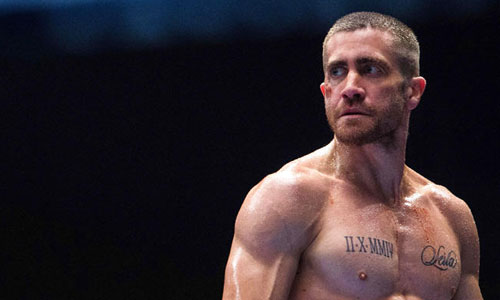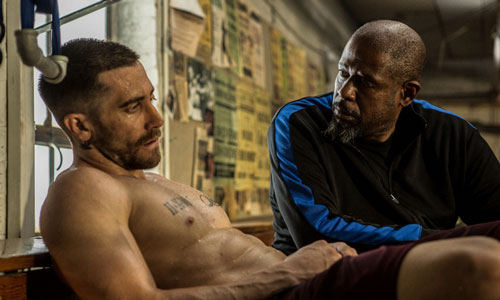It stands in the shadow of classic boxing films like the Rocky saga, and fails to carry the emotional weight of films like The Fighter and the ultimate tear jerker, The Champ.
It attempts to balance two familiar boxing scenarios, the story of a champ and his trainer and mentor, and that of a man torn between his family and his boxing career, but somehow the two disparate worlds collide, with violence ruling the narrative.
If you are looking for a boxing drama that focusses on physical brutality and macho aggression, Southpaw delivers in spades; it's a film that offers a heightened reality, never allowing us to fully crawl under the skin of a bruised fighter who wants to redeem his flawed existence, and empathise with his loss.
It's the latest film from director Antoine Fuqua (Training Day) and screenwriter Kurt Sutter, featuring Jake Gyllenhaal as Billy 'The Great' Hope, who seems to have it all when tragedy strikes and he hits rock bottom.

It was not a love of boxing that drove Gyllenhaal to star in the film; he was essentially unfamiliar with the sport before signing on, though he now calls himself an avid fan. For him, director Antoine Fuqua, who's a dedicated boxer himself and trains every day, was the main reason for his interest in the film to begin with.
Fuqua was determined not to make Southpaw "just another boxing movie", but was determined to find an actor willing to take on the role of Hope in the most literal, brutal way conceivable - no doubles, very few effects, little reliance on editing - just straight training and as faithful a replication of the boxing world as possible, right down to the camera work.
The film stems from an emotional truth; Sons of Anarchy creator Kurt Sutter's father was at one time a semi-professional fighter and, together with Fuqua and Gyllenhaal, was determined to craft a film that was both a realistic ode to the sport and a complex but relatable tale of familial and personal hardship.
Says Gyllenhaal: "The thing that intrigued me from the start was the idea that Billy's a guy who has got by on his rage and his own anger - made a career out of it, had great success and made lots of money from it. That anger can actually indirectly destroy you. Ultimately, for me, and know for Antoine as well, this is a story about a man coming to grips with his own anger, and the idea of what it is to be a father."
Developing the screenplay with Fuqua and Gyllenhaal, Sutter's approach to the story began to take shape from a specific metaphor for the character's personal journey to a more far-reaching theme.

"I realised that it really wasn't one man's story," says Sutter. "It was really this universal story about redemption, overcoming obstacles and personal demons, and putting others before you."
In order to build a strong foundation for an exceptionally realistic boxing film, Fuqua enlisted the services of legendary trainer and fight choreographer Terry Claybon. A former professional fighter who won three Golden Glove Championships and retired undefeated, Claybon has worked with some of entertainment's biggest names, including Denzel Washington, Kevin Spacey, Nicolas Cage, Matt Damon and Ben Affleck.
Using Sutter's script as a kick-off point, Gyllenhaal and Fuqua sought to create a seemingly real Billy Hope in tandem through a long period of patient, excruciating work.
The director and actor chose to train together with Claybon - who travelled everywhere with them - nearly every single day over the course of six months, learning the intricacies of a boxer's technique, physicality, and mentality. In those months, they worked twice a day, with Fuqua usually attending the first training session of the day in order to be present as the character took shape organically.
"Antoine decided that he would come with me on the physical journey," recalls Gyllenhaal. "It was amazing to have your director there with pushing you every day. That motivation and sacrifice is what drove both of us. I think that energy is in the film.
Gyllenhaal's journey to embody his character didn't just stop at the physical level. For him and Fuqua, entering into and understanding the mindset of a boxer was equally important in doing the justice to the script and role.
"The body will only function as far as the mind," notes Gyllenhaal. "I didn't really spend much time doing anything else or socialising in any other way."
"The approach in Southpaw was very much in line with his standard practice in preparing for performances, seeking to become the character rather than just play it. After a while what happens is you pick up the molecules of the world that you're in. I love to make things unconscious as an actor, and that takes time. When you play a character and you're in the world enough, you carry the molecules of that thing."
From preparation to the completing of shooting, Gyllenhaal developed an overwhelming respect for what actual boxers must endure mentally and physically.
"There is a legitimate question of life and death when you step in that ring that's unlike pretty much any sport and anything in society with the exception of going into the military," he observes. "I think in a way it's a beautiful metaphor for life in that you come into the ring on your own, you leave that way and the journey is yours. As a fight fan, to watch the strength it takes to be a professional fighter - the will, the preparation, the discipline and the artistry - is really moving to me."
Fuqua shares a similar, if not even greater, passion and respect for the sport.
"I find boxers to be the most vulnerable of all athletes of all because they leave a piece of themselves in the ring every time."
